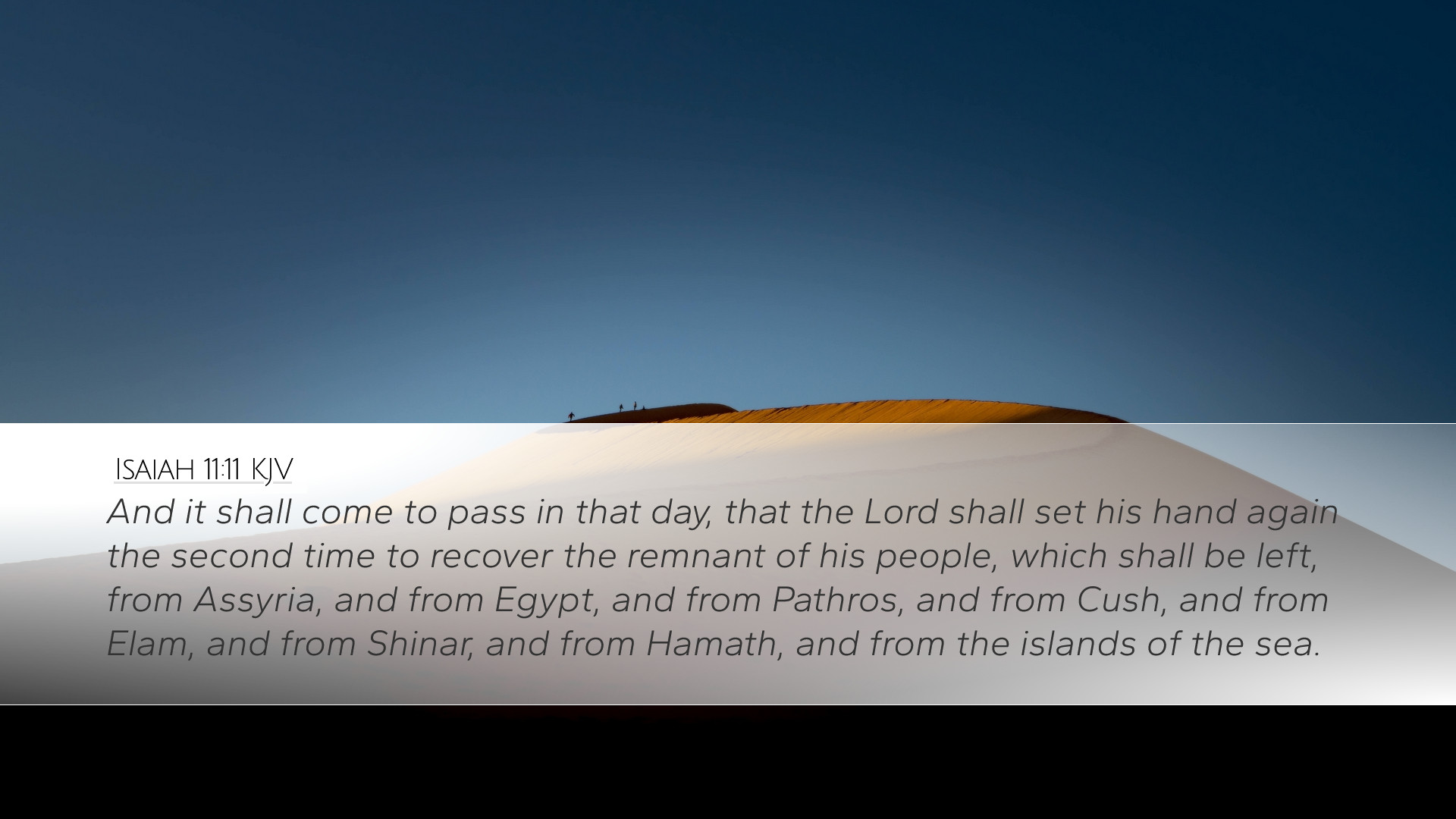Commentary on Isaiah 11:11
Verse Text: "And it shall come to pass in that day, that the Lord shall set his hand again the second time to recover the remnant of his people, which shall be left, from Assyria, and from Egypt, and from Pathros, and from Cush, and from Elam, and from Shinar, and from Hamath, and from the islands of the sea."
Introduction
This verse occurs in a passage rich with messianic prophecy and the promise of restoration. It speaks of a future time when the Lord will gather His people once again, highlighting themes of redemption, hope, and the sovereign ability of God to recover His remnant from various nations. Commentaries from esteemed sources provide in-depth perspectives on the implications and significance of this promise.
Textual Analysis
Isaiah 11:11 describes a divine action: the Lord will "set His hand again" to recover His people. This action emphasizes God's initiative in redemption, a recurring theme in Isaiah's writings. The specific nations mentioned illustrate the extensive reach of God's grace and His ability to gather His people from far and wide.
Matthew Henry's Insights
- Divine Intervention: Henry notes that this "second time" signifies God’s renewed effort after a previous restoration. It reminds believers that God is always at work, even after significant trials. His intervention is timely and purposeful.
- Gathering of the Remnant: The mention of "remnant" aligns with the biblical theme of God's preservation of a faithful group amidst widespread apostasy. Henry highlights this as a reassurance that God never abandons His true followers.
- Geographical Reach: The various nations listed emphasize the universal nature of God’s salvific plan. Henry comments that the mention of such diversities indicates that God’s grace is not limited by national boundaries.
Albert Barnes' Perspective
- Messianic Restoration: Barnes interprets this verse as a prophetic declaration concerning the coming of the Messiah. He emphasizes that the gathering of the remnant signifies the establishment of Christ’s kingdom.
- Symbol of Hope: Barnes notes that this promise provides hope to the Israelites in exile, assuring them that God remains faithful to His covenant despite their current circumstances.
- Inclusivity of God’s People: The diverse nations signify that the message of salvation is open to all. Barnes draws attention to the inclusive nature of God's plan, appealing to both Jews and Gentiles.
Adam Clarke's Commentary
- Historical Context: Clarke situates this prophecy within the historical context of exile and dispersion. He argues that this restoration could be interpreted as a physical and spiritual returning of God’s people to their homeland.
- Spiritual Interpretation: Clarke offers a spiritual interpretation, suggesting this gathering foreshadows a more profound spiritual gathering of believers in the New Covenant through Jesus Christ.
- Geographical References: Clarke highlights the significance of the geographical references, which serve to underscore the idea that no place is beyond the reach of God’s redemptive hand.
Theological Implications
Theologically, Isaiah 11:11 informs several key doctrines:
- Divine Sovereignty: The ability of the Lord to gather His people from the farthest corners of the earth underscores His sovereign will and power over history and nations.
- Hope and Restoration: This passage is a beacon of hope, reminding believers of God’s promise to restore and redeem, regardless of circumstances.
- Covenantal Faithfulness: The promise of restoration reflects God's faithfulness to His covenant, ensuring that His plan cannot be thwarted by human failings.
- Inclusivity of Salvation: The gathering from diverse nations foreshadows the Church's mission to reach all nations with the Gospel, emphasizing that every ethnicity and culture is invited into God's family.
Contemporary Application
For contemporary believers, Isaiah 11:11 serves as a powerful reminder that God's promises extend beyond the immediate context. Pastors and theologians can draw from this verse to encourage faith in God’s ongoing work of restoration and renewal.
- Encouragement in Trials: Just as the Israelites found hope in their future restoration, modern believers can anchor their hope in God’s constant presence during personal and communal challenges.
- Mission and Evangelism: The universality of God’s salvation encourages believers to participate in the Great Commission, actively seeking to share the good news with all peoples.
- Understanding God’s Character: This verse deepens the understanding of God’s character as a loving and faithful shepherd who tirelessly pursues His people, offering a profound foundation for trust in His plans.
Conclusion
Isaiah 11:11 encapsulates a significant declaration of hope and restoration that resonates through time. Rooted in the historical context of Israel’s struggles, it reaches forward into the promise of the Messiah and the ultimate gathering of God’s people. The insights from public domain commentaries enhance our understanding of this rich verse, inviting deeper reflection on God’s faithfulness and sovereign grace.


